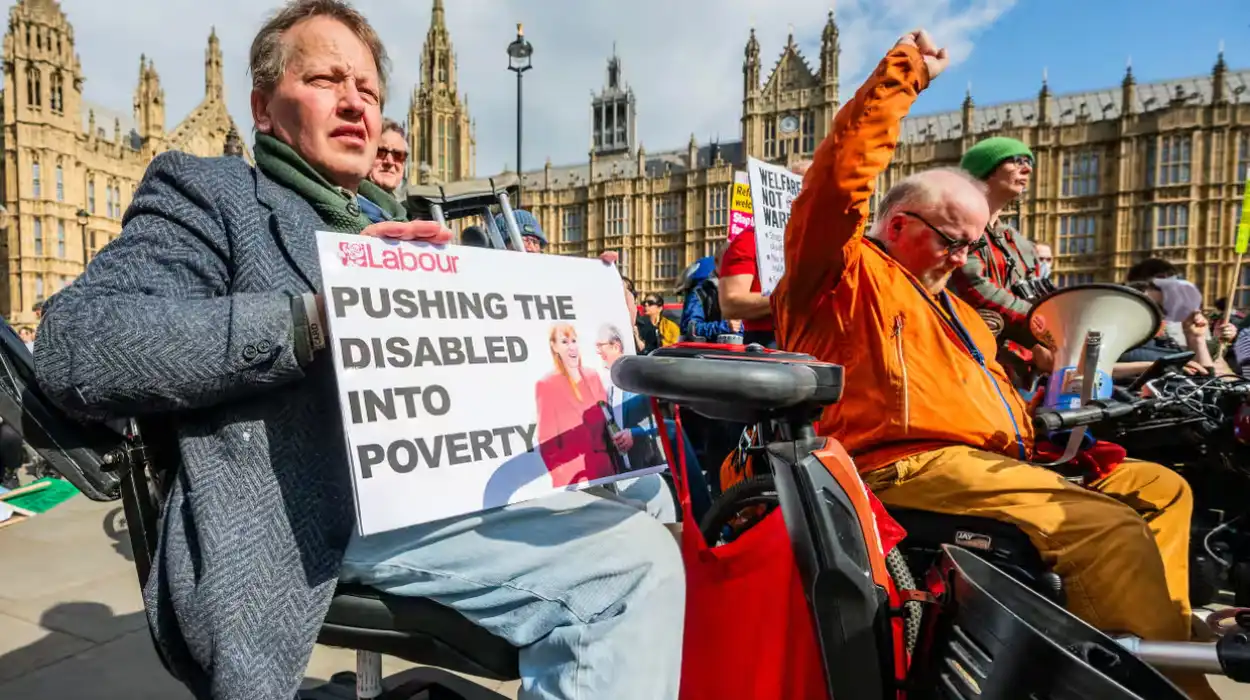UK (Parliament Politics Magazine) – Policy in Practice reveals Wales and northern England will bear the brunt of £5bn disability benefit cuts, with millions in financial losses for these regions.
As reported by The Guardian, new research shows a £5bn disability benefits cut will severely impact Wales and northern England, reinforcing poverty and inequality.
What did Policy in Practice find about disability cuts’ regional impact?
Research by Policy in Practice shows how proposed disability cuts will affect regions differently, with northern England and Wales facing severe impacts.
It reveals that North-east England, North-west England, and Wales will suffer significantly more from disability benefit cuts, with three times the economic loss of London.
According to the analysis, Blaenau Gwent, Hartlepool, and Blackpool, among the 10 most affected councils, will face economic losses five times higher than the national average.
Policy in Practice predicts 2.9 million people will be affected by the reforms, with losses totalling £6.8bn. It is estimated that by the end of the parliament, 8,000 individuals may lose PIP benefits ranging from £3,800 to £5,700.
The consultancy reveals that around 170,000 people in north-east England and 190,000 in Wales will be impacted, with financial losses of £400m and £470m, respectively. The economic loss in north-west England exceeds £1bn, impacting 430,000 residents (5.7%).
The research shows that nine out of 10 councils most affected by the cuts are in the north-east, north-west, and Wales, facing greater financial losses than other regions.
It said,
“Together this means that deprived areas that have more people on disability benefits who risk losing out also see a greater proportionate impact – an impact that hits an already struggling economy,”
adding,
“These reforms will work against efforts to level up local economies unless the cuts to disability benefits are replaced by other forms of investment.”
What did Deven Ghelani say about the impact of disability cuts?
Deven Ghelani, director of Policy in Practice, urged local officials to fully understand the impact of proposed changes on residents to address growing service demands and protect vulnerable populations.
He said,
“These reforms will have an uneven impact on different parts of the country. Some parts of the country will get a double whammy because they have a smaller economy and will lose a larger share of it.”
Mr Ghelani added,
“One of the reasons they have a smaller economy is that they have more people impacted so the proposals have a serious risk of entrenching existing patterns of deprivation.”
What did the DWP say about their Plan for Change and boosting employment?
A spokesperson for the Department for Work and Pensions stated,
“As part of our Plan for Change, we’re creating a sustainable welfare system that delivers proper support to help sick and disabled people to work, break down barriers, unlock work, boost living standards, and grow the economy.
They added,
“This is on top of our Get Britain Working white paper, which set out the biggest employment reforms in a generation – backed by £240m – working across government and with our mayors, local leaders, the NHS, and employers, to drive up employment and opportunity and grow the economy.”
The DWP stated,
“We must fix our broken benefits system so it is fairer on the taxpayer, supports those who can work to find employment, and protects those who can’t.”
What did ministers say about the benefits system overhaul and cuts?
According to ministers, changes are necessary to fix the “broken benefits system” that fails to provide job and skills support to disabled people who can work.
However, many MPs remain unconvinced, viewing the cuts as budget-saving measures targeting the most vulnerable.
How many UK households will be affected by disability benefit cuts?
Over 3 million UK households are set to be impacted by upcoming disability benefit reforms. Officials predict the changes will push 250,000 people – including 50,000 children – into poverty.
What did the Minority Rights Group say about UK welfare cuts?
MRG’s Disability Programme Coordinator, Lauren Avery said,
“This is without doubt an attack on the communities who already suffer from the worst forms of structural discrimination in the UK, cutting vital resources to those who are fighting to afford necessities and battling the isolation they experience in almost every aspect of public life.”
She added,
“It’s vital that disability organizations, organizations representing ethnic, religious and linguistic minorities, including the Deaf community, and the general public come together to oppose these inhumane cuts.”


